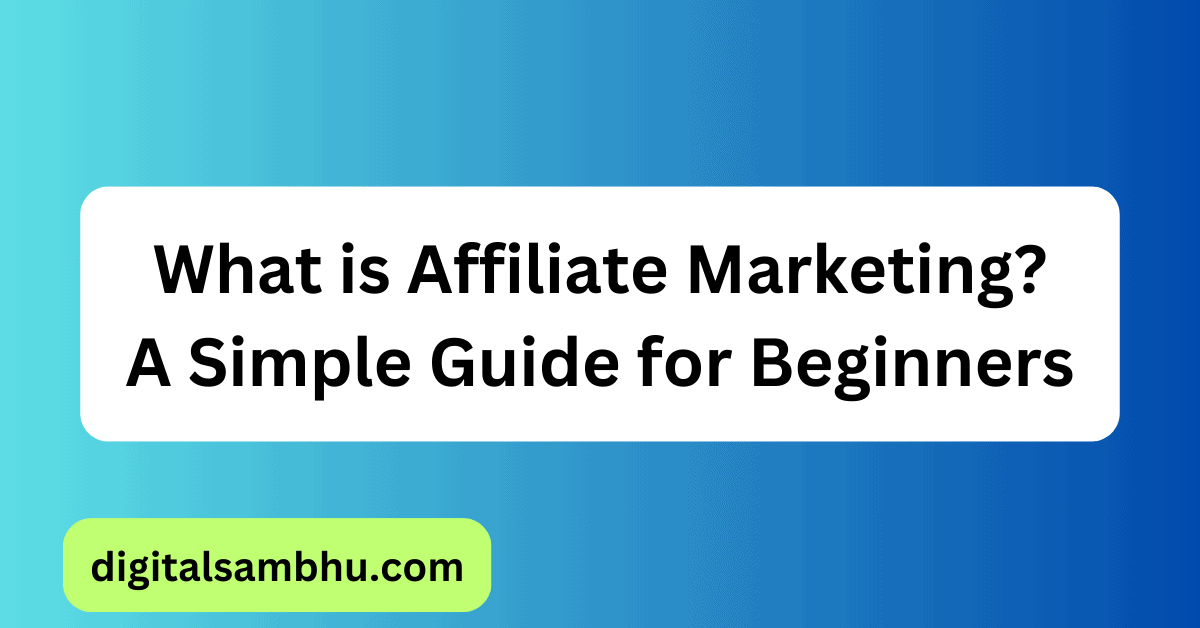Affiliate marketing is a symbiotic relationship between merchants and individuals known as affiliates, who promote products or services on behalf of the merchants. It has become a cornerstone of digital marketing, revolutionizing how businesses connect with their target audiences. In this article, we will delve into the intricacies of affiliate marketing and explore the exciting world of a free virtual event dedicated to this dynamic industry.
1. What is Affiliate Marketing? – A Free Virtual Event [For Beginners]

Affiliate marketing is a dynamic online marketing strategy where businesses, known as merchants, collaborate with individuals or entities, referred to as affiliates, to promote their products or services. This collaborative effort is built on a performance-based model, where affiliates earn a commission for each sale, click, or lead generated through their marketing efforts.
In simpler terms, it’s like having a team of online partners who help drive traffic and customers to a merchant’s website. Affiliates achieve this by utilizing unique tracking links provided by the merchant. When a consumer clicks on an affiliate’s link and makes a purchase or performs a specified action, the affiliate earns a commission.
This marketing model benefits all parties involved. Merchants gain increased exposure and sales without the upfront costs of traditional advertising. Affiliates, on the other hand, have the opportunity to earn passive income by promoting products or services they believe in, often within a niche they are passionate about.
Affiliate marketing is highly adaptable and has evolved with the rise of e-commerce and digital platforms. It continues to play a significant role in online business strategies, offering a win-win situation for both merchants and affiliates in the vast landscape of the internet.
- What Are Citations in SEO? A Beginner’s Guide
- What is Cloud Hosting? A Beginner’s Guide
- When Is the Best Time to Post on Instagram? Get More Likes & Followers
2. Evolution of Affiliate Marketing
The history of affiliate marketing is extensive, having begun in the late 1980s. However, its true potential has been unlocked in the digital age, where e-commerce and online platforms reign supreme. The expansion of affiliate marketing can be attributed to its versatility and efficiency in the dynamic realm of online commerce.
3. Key Players in Affiliate Marketing
Understanding the roles of merchants, affiliates, and consumers is pivotal to grasping the dynamics of affiliate marketing. Affiliates market the goods and services, merchants supply the goods, and customers use the affiliate links to complete purchases.
4. How Does Affiliate Marketing Work?

Affiliate marketing operates on a straightforward yet powerful mechanism that involves collaboration between merchants and affiliates. Here’s a step-by-step breakdown of how affiliate marketing works:
Partnership Establishment: Merchants (product or service providers) establish affiliate programs, inviting individuals or entities (affiliates) to join.
Affiliate Registration: Affiliates sign up for the merchant’s affiliate program, gaining access to unique affiliate links and marketing materials.
Receiving Affiliate Links: Upon registration, affiliates receive exclusive tracking links. These links are embedded in their promotional content and are used to track the traffic and sales they generate.
Content Creation: Affiliates create content to promote the merchant’s products or services. This can include blog posts, social media posts, videos, or any other form of digital marketing.
Incorporating Affiliate Links: Affiliates strategically incorporate their unique tracking links within their content. These links direct potential customers to the merchant’s website.
User Engagement: Consumers, enticed by the affiliate’s promotional efforts, click on the embedded affiliate links to learn more about the products or services.
Tracking and Analytics: The tracking links monitor the actions of users, capturing data such as clicks, leads, or completed sales. This information is crucial for calculating the affiliate’s commissions.
Commission Calculation: Affiliates earn commissions based on predefined actions, which could include a percentage of the sale, a fixed amount per click, or other measurable metrics.
Payment Distribution: Merchants regularly pay affiliates their earned commissions, typically through various payment methods such as bank transfers or online payment platforms.
Continuous Monitoring: Both merchants and affiliates continuously monitor the performance of the affiliate marketing campaign, making adjustments to optimize results.
This collaborative approach benefits merchants by expanding their reach and boosting sales without the need for extensive upfront advertising costs. Affiliates, in turn, earn passive income by leveraging their marketing skills and audience.
The success of affiliate marketing hinges on transparent communication, trust, and the alignment of interests between merchants and affiliates. This model has proven to be a mutually beneficial strategy in the digital age, fostering a dynamic and evolving online marketplace.
5. Benefits of Affiliate Marketing

Affiliate marketing offers a multitude of advantages for both merchants and affiliates, contributing to its widespread popularity in the digital marketing landscape. Here are the key benefits associated with affiliate marketing:
Cost-Effective Advertising: Merchants benefit from a cost-effective advertising strategy as they only pay for actual sales, clicks, or leads generated by affiliates. A favorable return on investment is ensured by this performance-based methodology.
Increased Reach and Brand Visibility: Affiliates, through their promotional efforts, expose the merchant’s products or services to a broader audience. This expanded reach enhances brand visibility and can attract new customers that the merchant might not reach through traditional marketing channels.
Diverse Affiliate Network: Merchants can tap into a diverse network of affiliates with varying skills, expertise, and audiences. This diversity allows for strategic partnerships with affiliates who align with the brand’s values and target demographic.
Passive Income Opportunities: One of the most alluring advantages for affiliates is the potential for passive income. Affiliates don’t need to be actively involved in sales to continue earning commissions once the first material is produced and the affiliate links are set up.
Flexibility and Independence: Affiliates benefit from freedom and flexibility in their jobs. They have the freedom to select the goods or services they want to advertise, create their own schedules, and use a variety of marketing techniques that play to their advantage.
Low Barrier to Entry: People with different financial means and degrees of experience can participate in affiliate marketing. It’s a desirable choice for people wishing to establish an internet business or supplement their income due to the low entry barrier.
Performance Tracking and Analytics: Both merchants and affiliates benefit from robust tracking and analytics tools. These tools provide valuable insights into the performance of the affiliate marketing campaign, allowing for data-driven decisions and optimizations.
Diversification of Marketing Channels: Merchants can expand the variety of their promotional channels by integrating affiliate marketing into their entire marketing plan. This boosts resilience in the constantly shifting digital marketplace and lessens reliance on a single marketing strategy.
Global Reach: Affiliate marketing transcends geographical boundaries, allowing merchants to reach a global audience through affiliates located in different regions. This global reach can significantly expand the market’s presence.
Mutually Beneficial Relationships: Strong, mutually advantageous relationships are created between merchants and affiliates through effective affiliate marketing. Trust, open communication, and common objectives all play a part in the partnership’s long-term success.
Affiliate marketing’s inherent advantages make it a dynamic and evolving marketing strategy that continues to shape the digital business landscape. The symbiotic relationship between merchants and affiliates remains a cornerstone for achieving marketing goals efficiently and effectively.
6. Types of Affiliate Marketing

Affiliate marketing encompasses various types and models, each offering unique approaches for advertisers and publishers to collaborate. Here are some common types of affiliate marketing:
Pay-Per-Sale (PPS): Advertisers pay affiliates a commission when the referred customer makes a purchase. This is the most prevalent type of affiliate marketing.
Pay-Per-Click (PPC): Affiliates earn a fee based on the number of clicks generated through their referral link, irrespective of whether the referred user makes a purchase.
Pay-Per-Lead (PPL): Advertisers compensate affiliates for driving leads or actions, such as sign-ups, form submissions, or trial registrations, rather than actual sales.
Pay-Per-Click-Per-Sale (PPC-PS): A combination of both PPC and PPS, where affiliates earn commissions for clicks as well as successful sales.
Two-Tier Affiliate Marketing: Affiliates earn commissions not only for the sales or leads they generate directly but also for the affiliates they refer to the program. It creates a hierarchical structure with primary and secondary tiers.
Multi-Tier Affiliate Marketing: Similar to two-tier marketing but with more than two levels, allowing affiliates to earn commissions from multiple tiers of referrals.
Influencer Marketing: Affiliates, often influencers, promote products or services through their content on social media platforms, blogs, or other online channels. Compensation is typically based on performance metrics.
Coupon or Discount Affiliate Marketing: Affiliates share exclusive discount codes or coupons with their audience, and they earn a commission for each sale made using those codes.
Content Marketing Affiliates: Affiliates create valuable content, such as reviews, tutorials, or blog posts, incorporating affiliate links. They earn commissions for sales generated through their content.
Email Marketing Affiliates: Affiliates use email campaigns to promote products or services, earning commissions for sales or leads resulting from their email marketing efforts.
Niche-specific Affiliate Programs: Some affiliate programs focus on specific niches, catering to niche audiences. Affiliates promote products or services relevant to that niche.
Bounty Programs: Advertisers offer a fixed amount (bounty) for a specific action, like a sale or lead. This model is common in industries like web hosting.
Choosing the right type of affiliate marketing depends on the goals and preferences of both advertisers and affiliates. It’s essential to understand the dynamics of each model and align them with the overall marketing strategy.
7. Benefits for Merchants
Affiliate marketing is used by retailers as an affordable alternative to traditional advertising, allowing them to reach a larger audience without having to pay high upfront fees. Businesses benefit greatly from the enhanced exposure and visibility of their brands.
8. Benefits for Affiliates
For affiliates, the allure lies in the opportunity to generate passive income while enjoying flexibility and independence. The ability to choose from a plethora of products or services to promote allows affiliates to align their efforts with their interests.
9. Choosing the Right Affiliate Program
Niche selection and thorough research are paramount when choosing an affiliate program. Identifying a niche that aligns with your interests and has demand in the market increases the likelihood of success.
10. Strategies for Successful Affiliate Marketing
Successful affiliates employ various strategies, including content marketing, social media promotion, and email campaigns. Crafting engaging content that resonates with the target audience is key to building trust and driving conversions.
11. Common Challenges in Affiliate Marketing
Affiliate marketing has drawbacks in addition to its advantages. Obstacles that demand strategic maneuvering include fierce rivalry, tracking problems, and search engine algorithms that are always changing.
12. Overcoming Challenges
Overcoming obstacles requires keeping abreast of market developments and cultivating enduring bonds with merchants and affiliates. Adaptability and a proactive approach are the cornerstones of success.
13. Case Studies
Examining case studies of successful affiliate marketers and gaining knowledge from their mistakes yield insightful information. The potential of intelligent affiliate marketing initiatives is exemplified by real-world examples.
14. Future Trends in Affiliate Marketing
Technological advancements and shifts in consumer behavior continue to shape the future of affiliate marketing. It’s critical for affiliates and businesses to stay on top of trends.
15. Tips for Attendees of the Free Virtual Event
For those attending the free virtual event on affiliate marketing, understanding the agenda and seizing networking opportunities are vital. Networking opportunities and a multitude of knowledge are promised by the event.
16. Why Attend a Free Virtual Event on Affiliate Marketing?

Attending a free virtual event dedicated to affiliate marketing provides a unique opportunity to learn from industry experts, gain insights into successful strategies, and build a network within the affiliate marketing community.
Frequently Asked Questions
Here’s a list of frequently asked questions.
Q1. What is affiliate marketing?
Affiliate marketing is a performance-based marketing strategy where businesses reward affiliates for driving traffic or sales to their website through the affiliate’s marketing efforts.
Q2. How does affiliate marketing work?
In affiliate marketing, affiliates promote a product or service through unique affiliate links. When a customer makes a purchase or takes a desired action through that link, the affiliate earns a commission.
Q3. What is an affiliate link?
An affiliate link is a unique URL assigned to an affiliate, allowing the business to track traffic and sales generated by that specific affiliate. Commissions are then awarded based on the activity through this link.
Q4. How do I become an affiliate marketer?
To become an affiliate marketer, you typically need to join an affiliate program offered by a business. After signing up, you’ll receive a unique affiliate link and access to marketing materials to start promoting the products or services.
Q5. How are affiliate commissions calculated?
Affiliate commissions are usually calculated as a percentage of the sale or a fixed amount per conversion, depending on the terms set by the business running the affiliate program. The specific commission structure is outlined in the affiliate agreement.
Q6. What is virtual event marketing?
Virtual event marketing refers to the promotion and execution of events that take place online, leveraging digital platforms to engage audiences, showcase products or services, and foster connections without the need for a physical presence.
Q7. What are the key benefits of virtual event marketing?
Virtual event marketing offers benefits such as broader reach, cost efficiency, real-time analytics, increased accessibility, and the ability to create engaging and interactive content, enhancing the overall participant experience.
Must Read: Why Affiliate Marketing is a Great Option as a Career in 2024?
Must Read: Why Affiliate Marketing is Best for Students in 2024?
Conclusion
In conclusion, affiliate marketing remains a powerful tool for businesses and individuals alike. The symbiotic relationship between merchants and affiliates, coupled with the continuous evolution of the industry, makes it an exciting field to explore. The upcoming free virtual event serves as a gateway to further understanding and success in the realm of affiliate marketing.
